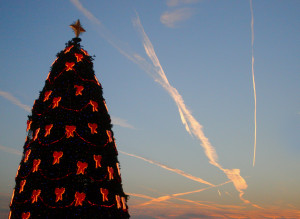Lincoln Chafee and The Politics of Christmas
Earlier this month, Rhode Island Governor Lincoln Chafee clashed with constituents and religious leaders after insisting that the 17-foot spruce inside the statehouse was a “holiday” tree. Chafee said that the choice not to call it a “Christmas tree” was in keeping with the state’s history as a haven for religious dissenters. Others – including a group of carolers who crashed the tree-lighting singing “O Christmas Tree” – said that it was an attempt to secularize Christmas.

The politics of Christmas is evidence of an increasing tension between traditional religious and cultural values and the increasingly diverse religious landscape. An overwhelming majority of Americans (96%) celebrate Christmas—including 93% percent of Americans not formally affiliated with a faith—and two-thirds (66%) say they usually attend religious services on Christmas Eve or Christmas Day. But while nearly 9-in-10 Americans (89%) celebrate Christmas and no other holiday, 6% celebrate Christmas along with another holiday.
At the same time, last December, less than half (49%) of Americans said that stores should use the phrase “merry Christmas” to greet shoppers, while 44% said that they should use the more generic “happy holidays” or “season’s greetings” out of respect for people of different faiths.
Some people of different faiths respond to the ubiquity of Christmas by engaging with the holiday. A recent Huffington Post article details how some Muslim families “take on some cultural aspects of the holiday” or even celebrate the birth of Christ, who Muslims see as a prophet if not a divine figure. Lisa Miller uses her own interfaith family to ponder how to be Jewish at Christmas, concluding that “though I would never consider myself anything but Jewish, I find that fir trees and Santa and imaginary flying reindeer are part of my life.”
Christmas symbols and imagery have become such a ubiquitous part of American culture that it is often difficult to separate the religious from the secular aspects of the holiday. For instance, many more Americans celebrate Christmas by watching Christmas movies (83%) than by singing Christmas carols (59%) or lighting advent candles (26%). As PRRI CEO Dr. Robert P. Jones points out, “Celebrations of the birth of Jesus in Christianity have always blended the explicitly religious with elements of the contemporary culture.”
Was Lincoln Chafee right? Is it more appropriate for the tree inside the Rhode Island Statehouse – clearly a Christmas symbol – to be dubbed a “holiday tree”? Or should Chafee have taken a leaf out of Barack Obama’s book, and acknowledged the Christian origin of the massive fir – while staffers prepared to kosher the kitchen for a Hanukkah party the next week?

